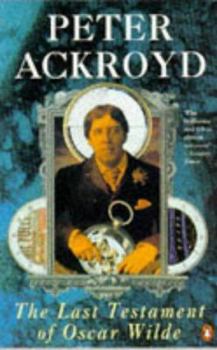Last Will and Testament of Oscar Wilde
Select Format
Select Condition 
Book Overview
Testify my brother! This description may be from another edition of this product.
Format:Paperback
Language:English
ISBN:0140171118
ISBN13:9780140171112
Release Date:January 1993
Publisher:Penguin Books, Limited (UK)
Length:192 Pages
Weight:0.30 lbs.
Dimensions:19.7" x 12.7" x 12.7"
Customer Reviews
3 ratings
The Last Testament Of Oscar Wilde by Peter Ackroyd
Published by Thriftbooks.com User , 14 years ago
A journal is being written by a lonely man in a Paris hotel room. It starts, for its sins, on 9 August 1900. There was nothing auspicious about the date, no connection to former grandeur or glory. But there has been a chance encounter, on a rare excursion outdoors, with three young Englishmen. They recognise the journal's author, one Oscar Wilde, and they refer to him as "she". It is an event worth recording, an event that prompts recollection and reflection on a life. Oscar Wilde's life was lived in public. Through exploration, then success and fame, and finally via notoriety and disgrace the author occupied a public mind. His talent was immense, his desire to exploit it almost single-minded and his success phenomenal. In an era when stardom in the modern sense was being invented, Oscar Wilde played the stage, published, courted society and self-promoted. He pushed at boundaries, sometimes not for reasons of art, but merely because they existed. He was, after all, an outsider, an Irishman of questionable parentage, but dressed elegantly in a frock coat and mingling with the highest. He thus became a star for a while, a centre of attention, a media figure. This was nothing less than celebrity in the modern sense, except, of course, that in his case there actually was some talent and ability in the equation. He was famous primarily for what he did, not for whom he became. But then there was a change. The fame was rendered infamy by publicity he could no longer control. And that downfall killed him. A final journal entry on 30 November 1900, recorded from the author's mumblings by a friend, Maurice Gilbert, records the event. Oscar Wilde had fallen while in prison, and had sustained an injury to an ear, an injury that festered. Early on in his recollections, Oscar Wilde recalls George Bernard Shaw saying that, "An Englishman will do whatever in the name of principle." Wilde's qualification was that the principle was inevitably self-interest. It is a beautiful metaphor, because as a talented - even gifted - young Irish writer, Wilde was promoted and enjoyed success while ever he bolstered others' positions. The moment he sought an assertion of his own right, however, he was disowned. Celebrity can thus rub shoulders with the rich and powerful, but only on their terms. And it was their terms that eventually killed him. The sybaritic Bosie encountered, the desire for things Greek aroused, Wilde found himself drawn into a society he could not resist. But he remained a self-confessed voyeur, and never became a participant. He thus remained forever the outsider, on the periphery of even his own vices. But he was eventually pilloried for what he became in the public eye to stand for. It remained only a state to which he aspired, if, that is, we believe him. The Last Testament Of Oscar Wilde thus hops repeatedly across the boundary that separates a public and a private life. Eventually the two distinct existences become blurred. Because one is always
PARODY OF PATHOS IN PARIS
Published by Thriftbooks.com User , 24 years ago
This is a most amazing book. One would almost believe that, like his beloved William Blake, Ackroyd has the ability to rendevouz with the spirits and have Wilde dictate this marvelous account of his exile in Paris. A cunning pastiche of Wilde's wit and wisdom, this book charts the decent into the human condition. Littered with irony and humour, this book will leave the reader hungry for more insights into the genius of Oscar Wilde and I would reccomend it to everybody, even the few that may not be aware of the subject matter. From the dens of sin to the oppressive beauty of Paris society, the reader is on the journey with Wilde all the way.
You would think it was Oscar himself
Published by Thriftbooks.com User , 26 years ago
There is humour and pathos here as Peter Ackroyd presents the voice of Oscar Wilde during Wilde's last days in Paris near the turn of the century. Though he was living in exile and was very poor, Wilde's observations are sharp and he bravely steps back from self-pity. He is able to assess his own life as an aesthete and writer. He spends his time in cafes, with English friends and with French acquaintances. As he becomes more ill the tone of the voice of Wilde becomes more poignant but till the end he is full of wit. At the very end he dies in his hotel room. This is an immensely satisfying book. All who are interested in Wilde will be drawn into Peter Ackroyd's poetic prose as he recreates from his own study and imagination the last days of the Irish wit and writer, with his degradation and dignity. In the end Wildes's literary wit triumphs and remains while his detractors and persecutors are forgotten




